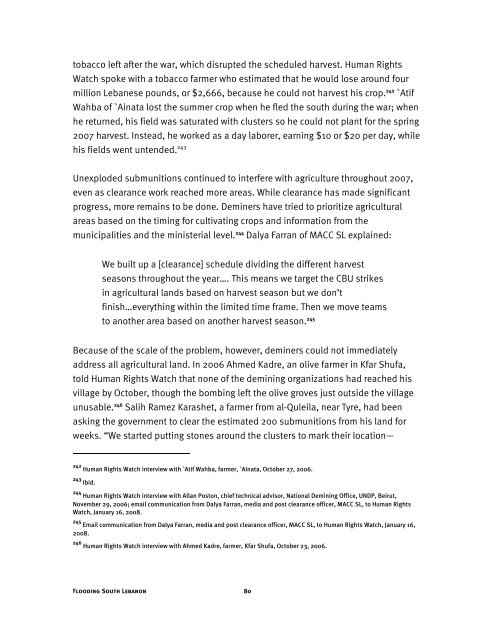Flooding South Lebanon - Human Rights Watch
Flooding South Lebanon - Human Rights Watch
Flooding South Lebanon - Human Rights Watch
You also want an ePaper? Increase the reach of your titles
YUMPU automatically turns print PDFs into web optimized ePapers that Google loves.
tobacco left after the war, which disrupted the scheduled harvest. <strong>Human</strong> <strong>Rights</strong><br />
<strong>Watch</strong> spoke with a tobacco farmer who estimated that he would lose around four<br />
million Lebanese pounds, or $2,666, because he could not harvest his crop. 242 `Atif<br />
Wahba of `Ainata lost the summer crop when he fled the south during the war; when<br />
he returned, his field was saturated with clusters so he could not plant for the spring<br />
2007 harvest. Instead, he worked as a day laborer, earning $10 or $20 per day, while<br />
his fields went untended. 243<br />
Unexploded submunitions continued to interfere with agriculture throughout 2007,<br />
even as clearance work reached more areas. While clearance has made significant<br />
progress, more remains to be done. Deminers have tried to prioritize agricultural<br />
areas based on the timing for cultivating crops and information from the<br />
municipalities and the ministerial level. 244 Dalya Farran of MACC SL explained:<br />
We built up a [clearance] schedule dividing the different harvest<br />
seasons throughout the year…. This means we target the CBU strikes<br />
in agricultural lands based on harvest season but we don’t<br />
finish…everything within the limited time frame. Then we move teams<br />
to another area based on another harvest season. 245<br />
Because of the scale of the problem, however, deminers could not immediately<br />
address all agricultural land. In 2006 Ahmed Kadre, an olive farmer in Kfar Shufa,<br />
told <strong>Human</strong> <strong>Rights</strong> <strong>Watch</strong> that none of the demining organizations had reached his<br />
village by October, though the bombing left the olive groves just outside the village<br />
unusable. 246 Salih Ramez Karashet, a farmer from al-Quleila, near Tyre, had been<br />
asking the government to clear the estimated 200 submunitions from his land for<br />
weeks. “We started putting stones around the clusters to mark their location—<br />
242 <strong>Human</strong> <strong>Rights</strong> <strong>Watch</strong> interview with `Atif Wahba, farmer, `Ainata, October 27, 2006.<br />
243 Ibid.<br />
244 <strong>Human</strong> <strong>Rights</strong> <strong>Watch</strong> interview with Allan Poston, chief technical advisor, National Demining Office, UNDP, Beirut,<br />
November 29, 2006; email communication from Dalya Farran, media and post clearance officer, MACC SL, to <strong>Human</strong> <strong>Rights</strong><br />
<strong>Watch</strong>, January 16, 2008.<br />
245 Email communication from Dalya Farran, media and post clearance officer, MACC SL, to <strong>Human</strong> <strong>Rights</strong> <strong>Watch</strong>, January 16,<br />
2008.<br />
246 <strong>Human</strong> <strong>Rights</strong> <strong>Watch</strong> interview with Ahmed Kadre, farmer, Kfar Shufa, October 23, 2006.<br />
<strong>Flooding</strong> <strong>South</strong> <strong>Lebanon</strong> 80
















